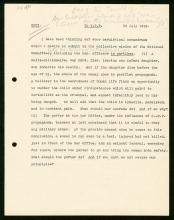BRACERS Record Detail for 116688
To access the original letter, email the Russell Archives.
This document is addressed to "W.G.R.", i.e. Gladys Rinder. Her first initial was W.; she always used her second name.
"I have been thinking about some casuistical conundrums which I desire to submit to the collective wisdom of the National Committee...."
In letter, document .200324, record 19337, BR writes: "Near the end [of the book in which correspondence was hidden to smuggle out of prison] you will find some moral problems upon which I want light from Salter's subtle brain."
Letter 54
BR TO GLADYS RINDER, 30 JULY 1918
BRACERS 116688. TL(TC). McMaster
Previous Brixton letter, BRACERS 116687; next letter, BRACERS 116363
Edited by K. Blackwell, A. Bone, N. Griffin and S. Turcon
<Brixton Prison>1
30 July 1918.
I have been thinking out some casuistical conundrums which I desire to submit to the collective wisdom of the National Committee,a including the hon. officers in partibus.2, 3 (1) A multi-millionaire, say Ford,4 dies, leaving one infant daughter, who inherits his wealth. But if the daughter dies before the age of 21, the whole of the money goes to pacifist propaganda. A believer in the sacredness of human life5 finds an opportunity to murder the child under circumstances which will point to Northcliffe as the criminal,6 and almost infallibly lead to his being hanged. We will add that the child is imbecile, paralysed, and in constant pain. What should our comrade do? And if so why? (2) The porter at the War Office, under the influence of N.-C.F. propaganda, becomes at last convinced that it is sinful to obey any military order. At the precise moment when he comes to this conclusion, a woman is run over by a taxi, injured but not killed, just in front of the War Office, and an eminent General, emerging for lunch, orders the porter to go and bring the woman into safety. What should the porter do? And if so, must we not revise our principles?
- 1
[document] The letter was edited from a typed copy (document 201180) of the original in the Malleson papers in the Russell Archives. The original appears not to be extant.
- 2
National Committee, including hon. officers in partibus BR was devising some playful moral conundrums to test “absolutist” principles on utilitarian grounds; if he was thinking of anyone in particular, it was probably Dr. Alfred Salter. This inflexibly absolutist Quaker physician had been elected the NCF’s Acting (not honorary) Chairman (replacing BR) in December 1917. After the same poll of NCF members, the rest of the National Committee was constituted as follows for 1918: Clifford Allen (chairman), Edward Grubb (treasurer), Fenner Brockway (hon. secretary), and (in ex officio roles) C.H. Norman, Catherine Marshall, and BR himself. Grubb, a Quaker, tended to side against the more militant Friends on policy matters (see Papers 14: 61), as did Brockway, who, in any case, was serving two years’ hard labour after being imprisoned for a fourth time in July 1917.
- 3
in partibusThere is a clue to what BR meant in referring to the honorary officers as being “in partibus”, which is abbreviated Latin for “in partibus infidelium” [“in the land of the infidels”]. BR felt that Lucien Price’s Dialogues of Alfred North Whitehead, OM, ought to have been titled Whitehead in Partibus, “partibus” being “everything outside the Isle of Thanet” (“Alfred North Whitehead”, 24 in Papers 11: 193). Whitehead’s birthplace there “dominated” the man BR knew: it had “a much more intimate place in his make-up than Cambridge”. At the time of the current letter several members of the National Committee were absent, because of health or incarceration, from their home ground, the NCF offices or related places of business.
- 4
Ford The wealthy and influential American industrialist Henry Ford (1863–1947) founded the Ford Motor Company and transformed manufacturing by the introduction of assembly line processes for the mass production of inexpensive automobiles. As BR indicated, any plutocrat would do.
- 5
sacredness of human lifeColette wrote at the head: “One of the tenets of the No-Conscription Fellowship was ‘we believe in the sacredness of human life’.” The NCF leaflet, Statement of Principles, issued in the spring of 1915, contained the statement that their members “consider human life to be sacred” (Thomas C. Kennedy, The Hound of Conscience: a History of the No-Conscription Fellowship, 1914–1919 [Fayetteville, Ark.: U. of Arkansas P., 1981]), p. 51.
- 6
Northcliffe as the criminal BR had developed a peculiar loathing for the politically powerful and reactionary press baron Alfred Charles Harmsworth (1865–1922, 1st Baron Northcliffe, 1905; Viscount, 1917), believing that his baneful influence was so great that he “could bring peace in three weeks if he chose” (16 Sept. 1916, BRACERS 18604).

